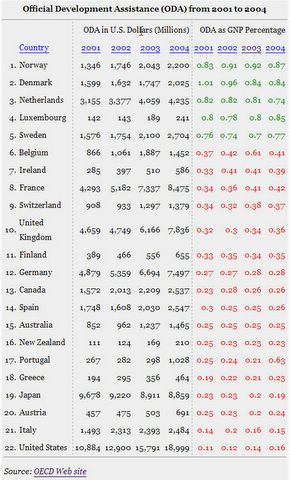It is a glaring indictment of our shared humanity that rich countries revel in obscene wealth, while poor ones wallow in extreme poverty.
Yet, for more than a half-century, people of conscience have pleaded to no avail for rich countries to help alleviate world poverty by redistributing a little of their wealth. Indeed, when the United Nations passed a resolution thirty-five years ago to cut world poverty in half by 2015, it seemed naïve at best.
Sure enough, the pledges rich countries made pursuant to that resolution never amounted to much more than political grandstanding. And, therein lies the perennial fallacy of rich countries making pledges to help poor ones. (Just ask the Indonesians how much of the billions pledged for Tsunami relief has actually materialized.)
Therefore, Wednesday’s announcement by the European Union of a noble plan to increase aid to poor countries – particularly former European colonies in Africa and the Caribbean – was greeted with justified cynicism. After all, this EU plan seems merely a restatement of the dishonored UN plan. But it is worth noting that where the UN plan called on all rich countries to contribute 0.7% of their national wealth (GDP) in aid to poor countries; the EU plan calls on the richer EU member states (like England) to contribute 0.51% and the others (like Slovakia) just 0.17%. Still, in dollar terms, this would mean an increase in pledges to poor countries from $40bn to $80bn annually by 2010, if the pledges are honoured.

Charting aid to the poor by rich countries as a percentage of GDP and in dollar terms over the past 4 years.
Unfortunately, some European countries have already manifested signs of dishonorable intent. In fact, Germany, Italy and Portugal demurred on their respective pledges by expressing misgivings about the noblesse oblige character of the plan. Specifically, they are loath to take up the (lingering) white man’s burden that obligates their fellow Europeans with colonial legacies to serve the needs of those they colonized. Indeed, to get a sense of how deeply this axis of non-colonial EU members resent any implied duty in this regard, one needs only recall their indignant objections to the EU banana preference regime that literally betrayed Europe’s position in its 6-year trade war the United States.
But Oxfam and other nongovernmental agencies (NGOs) that are often relied upon by rich countries to implement their aid programs lament that even EU countries with colonial legacies (like France) have a poor record of honouring aid pledges to poor countries. Moreover, that almost every intervening event (even the shifting winds of domestic politics) has been cited for the failure of these countries to honour their donor commitments.
And, that’s just the rich Europeans. After all, the subsistence of many poor countries have long depended on direct aid from even richer countries like the United States, Japan and, increasingly, China. But the record on fulfilling aid pledges amongst them is no better. Indeed, the US in particular has been roundly criticized not only for failing to honour its promises but also for giving so little of its considerable wealth in aid to poor countries. For example, many organizations in the fight against HIV/AIDS rue the prohibitive conditions President Bush placed on his $15bn pledge to help treat this disease; and, many involved in the fight against poverty complain that the US gives the lowest amongst rich nations (0.11) as a percentage of its GDP. (See chart above)
Beyond their scandalous failure to honour pledges, however, rich countries have also participated in kickback schemes on the aid they actually do give that would make even Third World kleptocrats blush. After all, a dollar pledged to aid the poor is invariably disbursed, more or less, as 10¢ to the recipient and 90¢ to the “aid administrators”. In fact, a recent report on the politics of foreign aid:
…highlighted the ways in which they were disguising how real aid flows were even lower than they appeared to be. [The report pointed out that] failure to target aid at the poorest countries, runaway spending on overpriced technical assistance from international consultants, tying aid to purchases from donor countries’ own firms, cumbersome and ill-coordinated planning, implementation, monitoring and reporting requirements, excessive administrative costs, late and partial disbursements, double counting of debt relief, and aid spending on immigration services all deflate the value of aid.
It must be noted, however, that no discussion or criticism of the failure of rich countries to honour their aid pledges would be complete without acknowledging the even more scandalous failure of poor countries to manage the aid they receive responsibly. After all, it has become axiomatic that corruption is part of the culture of life in most developing countries. With the end of the Cold War, however, donor nations no longer have as much strategic interest in these countries. They are now less inclined to turn a blind eye to the rampant misappropriation and gross mismanagement of aid that was so customary.
Therefore, concomitant with challenging rich countries to increase and fulfill their pledges, we must require poor countries to demonstrate more transparent accounting for (and sensible use of) foreign aid. Because, despite shortchanging and other shortcomings, the cumulative data on the aid rich countries have donated compels one to wonder why poor countries have not done more to alleviate extreme, chronic poverty in their midst.

Man’s inhumanity towards his fellow man suggests that no amount of money will ever rid the world of images like this…
Nevertheless, the United Kingdom deserves special commendation for formulating this EU plan and securing similar commitments from the US, Japan and Canada. Indeed, the world’s richest nations intend to draft one new global plan (to attempt once and for all) to bridge the obscene gap in wealth between rich and poor countries when they convene at the next G8 summit this July.
Say brother, can you spare a dime….
News and Politics

Legacy Note: With over 5,600 posts spanning 20 years, I am easily the most prolific blogger on the most eclectic array of topics on the web. That makes The iPINIONS Journal an unparalleled archive of informed political and cultural commentary. Visit the ARCHIVES section in the sidebar or search by topic. You won’t find a more consistent, independent voice on world affairs.
Leave a Reply
You must be logged in to post a comment.